Prior to Christmas 2020, new restrictions were introduced in Sweden to reduce the spread of infection. At the same time, there was a decline in the public’s confidence in politicians, who were also perceived to be less in agreement about how the pandemic is being handled, than previously. These are two of the latest findings of a study being conducted by the non-profit organisation VA (Public & Science) to investigate communication about the coronavirus in Sweden.

In collaboration with researchers from the Karolinska Institute and Södertörn University, VA (Public & Science) is conducting a study of how people are receiving and interpreting information about the coronavirus and the ongoing pandemic.
On 15 December 2020, the Swedish Corona Commission submitted its first interim report criticising the government and regions’ measures to protect those in residential care. A few days later, on 18 December, new restrictions were announced, including a ban on serving alcohol in restaurants after 8pm, and a recommendation to wear face masks on public transport during rush hour. The twelfth wave of the survey was carried out on 17-22 December.
Less confidence and reduced agreement among politicians
After rising sharply between October and November, confidence in politicians who comment on the coronavirus in the Swedish media fell by seven percentage points in December. Women have greater confidence in politicians compared to men, and supporters of the Social Democrats have greater confidence compared to supporters of other parties. Confidence in other professional groups that comment on the coronavirus in the media remains at a similar level to November. Doctors and other healthcare professionals enjoy the most confidence (91 percent), followed by researchers (87 percent), government officials (61 percent), politicians (29 percent) and journalists (21 percent).
In December, politicians were perceived to be much less in agreement in their views on how Sweden is handling the corona pandemic compared with previously. One in three Swedes (34 percent) perceived politicians to be fairly or very in agreement in December, compared to one in two (50 percent) in November. Women and those with a university degree perceive politicians as more in agreement than men or those who have not gone to university. Doctors and other healthcare professionals are perceived to be most in agreement when it comes to the handling of the pandemic (84 percent), followed by government officials (70 percent), researchers (67 percent), journalists (43 percent) and politicians (34 percent).
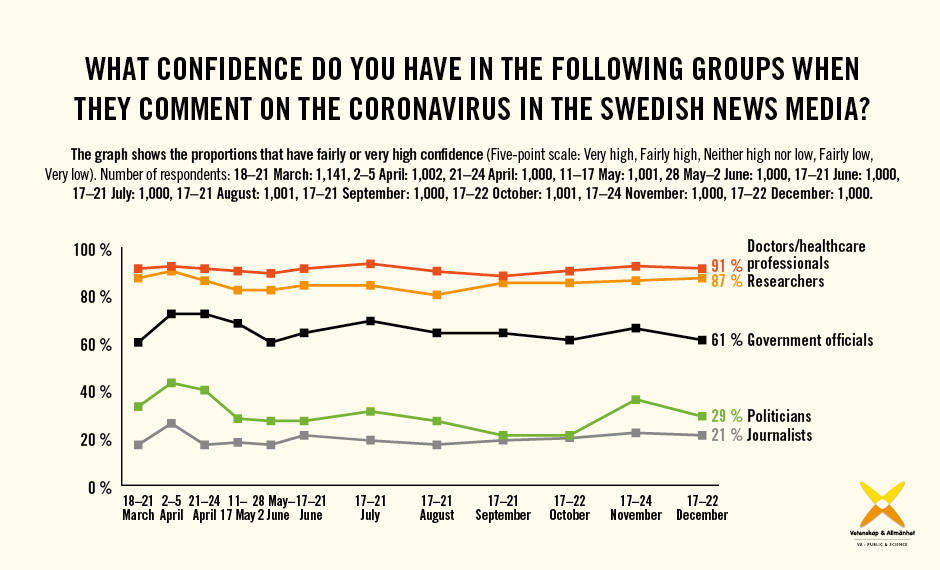
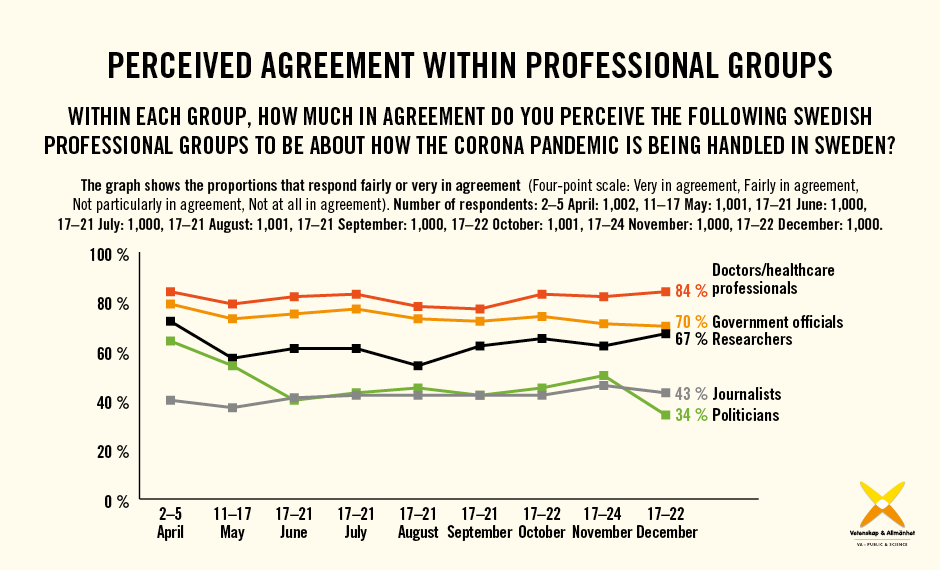
Similar consumption patterns and strengthened confidence in the news media
Swedes consumed news about the coronavirus to almost the same extent in December as in November. The most common channel for accessing news about the coronavirus is Swedish Television (SVT), which seven out of ten (69 percent) have accessed over the preceding two days. This is followed by TV4 and the tabloid Aftonbladet (39 percent for both) and Swedish Radio (38 percent). Men get information from Svenska Dagbladet and foreign media to a greater extent than women. Younger people (18–29 years) consume other news media more often than other age groups and are also more likely not to access any news at all (six percent among younger people compared with three percent among the population as a whole).
Swedes’ confidence in the media’s reporting on the coronavirus increased slightly in December for all news media. The greatest increase in confidence can be seen for the daily newspapers Svenska Dagbladet (an increase of 13 percentage points) and Dagens Nyheter (11 percentage points). As previously, overall, the majority of Swedes have high confidence in SVT (80 percent have fairly or very high confidence), Swedish Radio (76 percent) and TV4 (56 percent). The evening tabloids Expressen (17 percent), Aftonbladet and foreign media (both 23 percent) have the smallest proportion with high confidence.
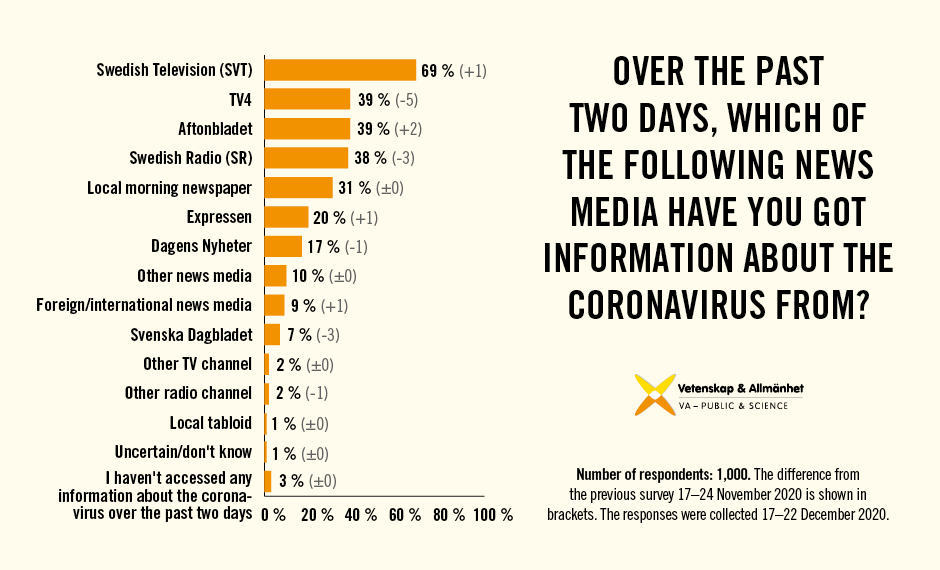
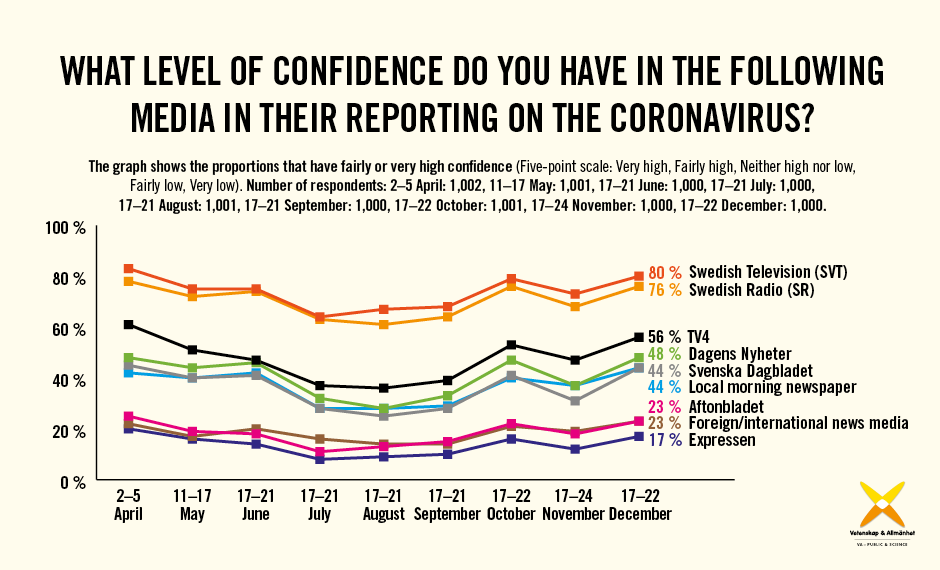
Hyped tone of reporting
As in November, around half of Swedes (52 percent) perceive the tone of reporting on the coronavirus as fairly or very hyped/alarmist. Whereas, eight percent consider the reporting to be fairly or very watchful/cautious. Among men aged 18-29, one in five (19 percent) perceive the reporting to be predominantly watchful/cautious, compared with one in twenty (5 percent) women of the same age.
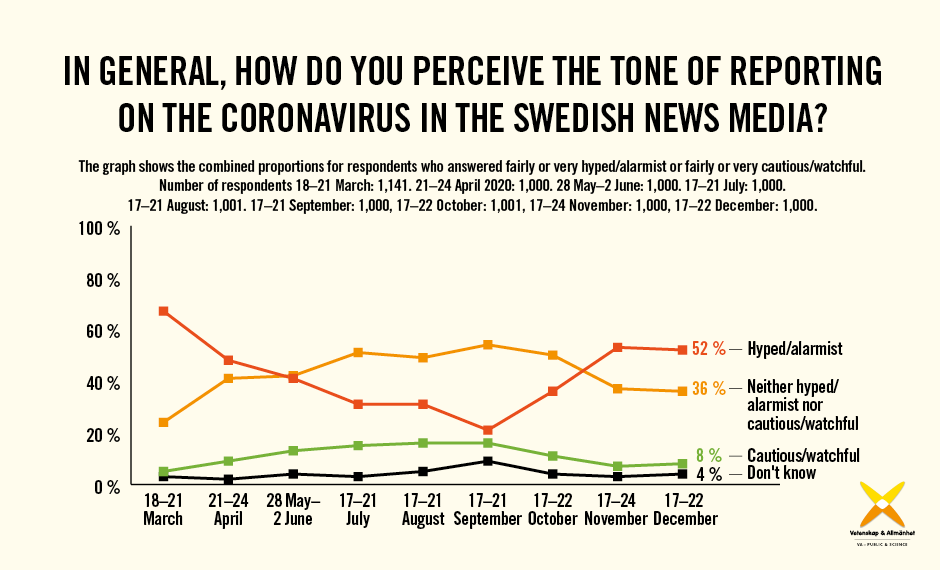
About the survey
The survey was conducted by Kantar Sifo and consisted of 1,000 interviews with a web panel based on random sampling. The interviews were conducted 17–22 December 2020. The results are weighted based on gender, age and region of residence.
In order to monitor the Swedish public’s news consumption, confidence in key professional groups and attitudes towards media reporting over time, we are conducting a number of studies during the course of the pandemic. We also plan to undertake a content analysis of reporting on the coronavirus in the Swedish media in order to map any changes in reporting during different phases, and how this relates to public attitudes during the same time period.
The study is being conducted with the support of the Anne-Marie and Gustaf Anders Foundation for Media Research, Karolinska Institute, LIF – the Swedish Association of the Pharmaceutical Industry, Södertörn University, the Wenner-Gren Foundations and the Swedish Research Council.
Read more about VA’s study and the results of the first, second, third, fourth, fifth, sixth, seventh, eighth, ninth, tenth and eleventh waves of the study.

